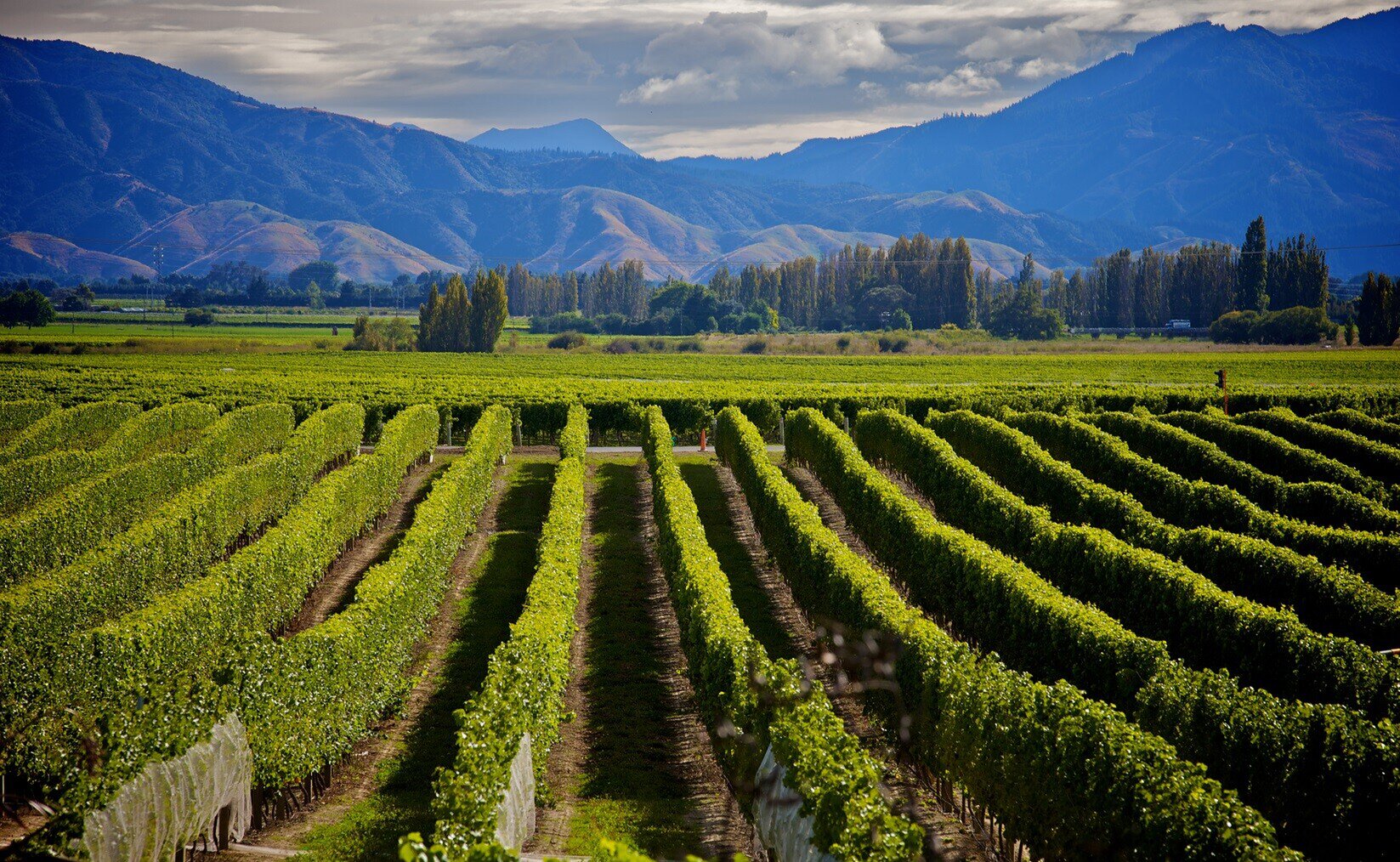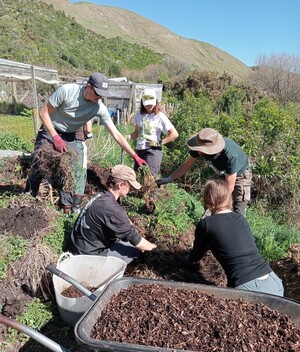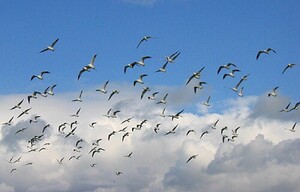Sustainable Agriculture & Food Systems Aotearoa
New Zealand is a world leader in primary production, with agriculture its biggest industry. Dairy, honey, eggs, meat, wool, wine, fruit, vegetables, seafood and timber from Aotearoa are exported around the globe. Agroecological and indigenous agricultural practices make important contributions toward sustainable management of water and land, and toward a zero-carbon economy.
We have a strong focus on forward-thinking to meet the challenges of sustainable food production in an ever-more sophisticated market that demands high-quality, high-value and diverse products as well as environmental accountability.
Biosecurity (pests and pathogens), water quality, maintaining biodiversity, and reducing emissions are key focus areas for innovation, research and development, with a view to future-proofing existing and new production systems.
Resilient Food systems
Agroecology, sustainable land use, and systems thinking underpin the pathways to resilient food systems. Water quality, maintenance of biodiversity, and reducing emissions are key focus areas for innovation and development.
Indigenous knowledge and food sovereignty are integral parts of long-term viable food production and supply. The Māori agribusiness sector is distinctive and offers unique insights and opportunities for collaborative models.
Integrating people, communities, and values with primary production systems can ultimately result in a rich and multi-cultural approach to food systems.
"The Sustainable Agriculture and Food Systems Aotearoa program looks to build on an incredible history of EcoQuest developing change agents for a better environmental future by digging in deep with agriculture. I can only imagine the leaders that will emerge from this experience and expect to see them shaping their communities for the better."
Alex Bryan, BA UMICH; EcoQuest '07; University of Michigan Sustainable Food Program Manager; Co-Owner of Detroit's Food Field; Founding Board Member National Young Farmers Coalition; Former Director of Agricultural Programs, Greater Lansing Food Bank
Program Overview
We provide an exciting mix of academic rigour, place-based and hands-on learning. This gives students great opportunities to engage with a variety of agribusinesses in New Zealand.
The goals of this program include enabling students to gain an in-depth understanding of:
- Global trends in agricultural sustainability and sustainable land management, challenges and manifestations of these trends in Aotearoa New Zealand.
- Political, economic and cultural models of agriculture.
- Situating agriculture in an ecosystems framework. Aligning land use with land use capability and landscape resilience in a manner compatible with existing and future ecological, social, cultural, economic, and political contexts.
- A systems approach to socially and culturally durable, economically viable, and politically expedient pathways enabling a transition towards agricultural sustainability and ecological resilience at scale.
We aim to empower students with experience, tools, professional, and life skills to engage with sustainable food systems and to be pro-active, solution focused practitioners.
Learning Journeys
The bulk of the program is delivered in Te Waipounamu the South Island of New Zealand.
Students live and travel together with faculty and staff. The program starts and finishes at the EcoQuest Centre in Whakatīwai. The team travels south via Taranaki and Wellington. Once we get to the Tasman District, we spend time at several locations that enable us to make the most of the diverse landuse and agribusiness in this district. Field trips also take us to Nelson, Marlborough and Canterbury .
Each week has a theme closely related to the particular land-use, agriculture practices and produce of the locality we are in. Field visits and the associated learning opportunities focus on topical, real-time case studies in a variety of production systems (including a variety of cropping systems) and agribusiness.
Lectures, tutorials, discussions, peer-teaching, assignments and project work are all part of the program. To gain practical skills and experiences, and to increase competency in farm and food systems related work, students will be on farm / agribusiness placements for a total of 20 working days (two placements of 10 days each) as part of the ‘Agricultural production and business practice’ course. Students will be at these placements with several peers, accompanied by a staff member. During these farm placements faculty will spend time with all students to guide their learning and on-farm experiences.
We stay overnight on a marae during each semester, giving students lived experience of Māori culture and the re-assertion of traditions which are key elements in the transition to sustainable practices in agriculture and food systems in Aotearoa New Zealand.
Delivery sites
The program is delivered principally in the field, in Te Tau Ihu o Te Waka a Māui the Top of the South Island, in the rohe of Ngāti Tama, Ngāti Rārua and Te Ātiawa.
We make ourselves at home in the Tasman District, where students are welcomed on to Te Āwhina Marae, in Motueka. We stay several weeks in Motueka, Kaiteriteri, and Pohara/Takaka. Field trips take us to Nelson, Marlborough, Canterbury, and -depending on the season- to Taranaki in the North Island.
Student accommodation is typically in cabins with 3-4 students per cabin. Students and staff share the preparation of food. At all places we stay there is plenty of room for work and play: indoor common rooms and classrooms, and beach, rivers, and forest are never far away (in Golden Bay, the sandy beach of is our front yard). Since programs are residential, some staff live on site.
Farm Placement
As part of the program, students spend 20 days (commonly two placements of 10 days each) in placements on farms or in agribusiness. Students have the opportunity to engage in hands-on agribusiness/farm activities, longitudinal monitoring of effects of management practices and strategies on soils and crops, as well as explore business models, and local market dynamics. Students translate their academic learning to make significant contributions in real time. Students are at the placements in small groups, which enables teamwork and provides peer support. Faculty and staff accompanies students on these placements.
The 22
This 22-acre farm is located on the fertile soils of the Wairau plains in the Marlborough District, on the outskirts of Blenheim. Students work with a family-run enterprise in a peri-urban setting. Current land use is a mix of traditional seed crops (peas, garlic, pumpkins, and grain). Sheep are used for weed control and small-scale year round grazing in the orchard. With intergenerational succession, the family is looking to implement a holistic and regenerative approach to using the land. The guiding principles for the family are to model sustainable, agroecological, and ethical land use, to grow food for, and link with the urban food system, and to promote value-added products. The family is in the early stages of implementing a permaculture plan that incorporates existing infrastructure: an olive grove which has recently been restored, a woodlot, fruit trees and a greenhouse. Fig and nut trees have been planted. The family is keen for the farm to become a learning hub for sustainable food and living, through connected, place-based activities. This farm placement offers opportunities to be part of an exciting urban food system initiative in the early stages of growth. Students are part of scoping the directions of development of the farm, implementing strategies and monitoring long-term outcomes.
Aside from the opportunity to develop practical, transferable skills, there are deeply layered components to the academic purpose of the farm placements (and other hands-on learning) in the SAFSA program.
If our students are to become agroecologists, be they academics, policymakers, or practitioners on the land and in the food chain/food systems, then fundamental to them is the ability to engage at the farmer-to-farmer level through relationships of trust, based in large part on respect for practical experience. They need to be able to work next to someone, to understand at a practical level their economics, and to engage with their kaupapa or purpose.
Related to this is that a deep understanding of any agroecological system requires that the observer be able to become part of it, to live and work in it. Not all (perhaps not many) phenomena can be contrived into existence for the casual (or even scientific) observer. They must be collected as the world is moving, like flakes of gold in the sand, and woven into a tapestry of place.
There is another valuable kind of practical experience that students gain, which is that of cross-cultural communication.
Willy Cameron, lead academic for the Sustainable Agriculture and Food Systems Aotearoa program, EcoQuest
Ellis Creek Farm
Ellis Creek Farm is a family owned farm raising beef and a variety of other produce using a regenerative approach. The farm is located in Golden Bay, not far from the town of Takaka. The family’s aim is to ethically raise healthy and contented animals on spray-free regenerative pasture, improving the capacity of the land to sequester carbon, build organic matter, and protecting and enhancing waterways. This family-run enterprise produces, and direct-markets beef, eggs, avocados, and other produce to the local market. The farm is reducing reliance on external inputs and building soil fertility and health through closed loops that utilise on farm residues, and through enhancing soil microbiology. Hands on skills in assessing the state of soils, and techniques of soil improvement are a key aspect of learning at Ellis Creek Farm. An in-depth understanding of the business plan and marketing approach of the farm is also part of the real-life learning, enabling students to develop a nuanced view of local food systems and the transition to regenerative agriculture that is occurring across Aotearoa New Zealand.
Courses
SAFS670 Systems Thinking: Land Use Capability and Sustainability
4 Credit Hours. Permission (Coreq: SAFS671, SAFS672, SAFS673)
Course Description
This course establishes a conceptual framework (lens) in systems thinking to critically examine New Zealand and global examples of the challenges that have arisen from the mismatch between land use and land use capability. Students investigate downstream effects of the rural-urban divide (food-justice), on people, health, services and the environment. Food security, ethical foods, as well as the influence of climate change on food supply and the viability of agribusiness are included.
Course Goals Include
Using systems thinking to enable students to access and apply the information and conceptual tools available for a robust and defensible analysis of agricultural sustainability problems and causes.
Learning outcomes
- Identify individual elements of an agricultural system
- Describe the dimensions of sustainability and examine the definitions of ‘sustainable land use’ and ‘land use capability’.
- Explain links and interactions between elements that comprise the whole of an agricultural system.
- Illustrate how Treaty Settlements have enhanced or hindered the iwi economy (tribal, Māori economy) in the agricultural sector.
- Explain the role of Kaitiakitanga (guardianship) in preserving biodiversity, while maintaining productivity in agricultural food systems.
- Recognise the scope of Te Tiriti ō Waitangi and the RMA (1991) to influence land use in New Zealand.
- Determine the scope of systems thinking to deliver improvements toward sustainability for a chosen case study.
- Analyse the importance of systems thinking in achieving food-justice and food-security.
- Detail a model of food production, processing, transportation and consumption that may be considered resilient and sustainable.
- Discriminate between collaborative models and co-management models.
- Prioritise the components of an agroecosystem in a manner that allows for the construction of a draft problem analysis.
SAFS671 Agroecology and Sustainable Land Management
4 Credit Hours. Permission (Coreq: SAFS670, SAFS672, SAFS673)
Course Description
Agroecology is a way of thinking and acting. Using this lens, students investigate the interface of agriculture and the natural environment. Through first-hand experiences with agribusiness, students explore enduring solutions for sustainable food systems. The emphasis will be on dimensions of agroecology that are relevant in a framework of sustainable land management; and on gaining confidence in evaluating processes and science associated with the biological and physical process in agroecosystems.
Course Goals Include
Agroecology promotes taking the long-view; the long-view promotes scrutiny of our relationships with food and agriculture, as well as of the consequences of globalization for agroecosystems. The issue of scaling up solutions is of critical importance. Case studies are a crucial part of this course to engage the students at the level of first-hand experiences of agribusiness, specifically through the lens of agroecology and sustainability.
Learning outcomes
- Know the relevant principles and concepts of agroecology.
- Illustrate how communities (biota) in agroecosystems respond to various land management practices.
- Distinguish between causes and symptoms of unsustainable land management.
- Reflect on knowledge about the political pathways / political will to support sustainable land management in their home environment.
- Carefully consider whether, and illustrate how, agroecological principles can be harnessed in soil, plant and pest management in order to achieve integrated response measures for solution-focused changes in land management.
- Research what is considered the mainstream approach to agriculture, provide clear definitions, and explore the term ‘mainstream’.
- Scrutinize and debate the consequences of globalization for agroecosystems and our relationships with food and agriculture.
- Generate a critical path analysis in which social, economic, political and cultural components are an integral part of the decision-making process for the development of new agricultural ventures.
- Based on field visits, outline and explain the differences between the agroecosystems of two case studies, and how agroecology does or might enhance sustainability
SAFS672 Pathways to Sustainable Agriculture and Food Systems
4 Credit Hours. Permission (Coreq: SAFS670, SAFS671, SAFS673)
Course Description
This course empowers students to pursue knowledge and understanding of food systems around the interface of policy, practice, and science to build pathways toward technically robust, economically sound and viable solutions which enable transformation in the rural landscape. Topics include: value systems, socio-cultural benefits of re-thinking food systems at scale, carbon-forestry, carbon offsets, nutrient cap-and-trade models, (Integrated) Catchment Management and Climate Smart Agriculture. Critical thinking, and risk assessment tools are integral components.
Course Goals Include
Re-thinking food systems to achieve sustainable practices and produce is a key component of this course. Students will investigate the role of small to medium-scale farm operations in the domestic and export markets. The concept of the value-chain (and the interdependence of various components of value-chains), added value initiatives, farm-to-market initiatives and crop (product) diversification are part of this course. Community initiatives to reconnect food production processes and kaitiakitanga (guardianship) of the natural environment are part of this course.
Learning outcomes
- List and illustrate market, and institutional / regulatory tools and incentives available to streamline progress toward sustainability for food systems;
- Outline and explain added value processes and crop / land use diversification.
- Review and discuss the role of community initiatives in changing our relationship with food, reducing food waste and implementing climate smart solutions.
- Construct a compelling case for either cap and trade models, integrated catchment management, climate smart agriculture or carbon farming.
- Relate kaitiakitanga of natural resources to food production initiatives and models that promote healthy living, fresh foods, local employment and a reduced carbon footprint.
- Investigate if and how power imbalances influence food systems.
- Compile a comprehensive list of risks to agriculture and food systems in New Zealand and provide a brief outline for each item on that list. Discuss two of these risks in-depth.
- Construct a detailed diagram of the potential policy influences on food systems.
- Based on the field visits, case studies, and coursework, prepare a detailed implementation strategy (including a time line). This strategy is built on interdisciplinary approaches to bringing about positive change in the field of agriculture and food production.
- Assess the needs of stakeholders, and any barriers they are aware of and document conflict resolution processes that are needed or have been used.
SAFS673 Agricultural Production and Business Practice
4 Credit Hours. Permission (Coreq: SAFS670, SAFS671, SAFS672)
Course Description
In this experiential course students will spend time in farm or agribusiness placements. Practical, hands-on experience of the workings of agribusiness provides students with opportunities to enhance their autonomy and capacity as active learners. Students will gain transferable skills, increase competency and develop a comprehensive understanding of sustainability initiatives and practices of food systems. Students can transfer insights from classroom work to a practical setting and bring previously developed skills to a new context.
Course Goals Include
In this course, students will apply both their theoretical learning to real world situations and get their fingers dirty. Placements are not contrived, staged or laboratory situations. Students will engage directly with authentic and ongoing sustainable agriculture and food enterprises, use the material developed in the other courses to actively assist them on their journey.
The course has dual goals; to physically challenge students with on-farm activities of their placement hosts, and also to work with their hosts to assess and find workable sustainable solutions to business, social or infrastructure challenges they face.
Placement tasks can range from developing infrastructure and systems with placement hosts, assisting with marketing and market development to ongoing to the ongoing care and harvesting of food and agricultural products.
Learning outcomes
- Fully engage for a total of 20 days in (unpaid) placements in sustainable agriculture or food enterprises. They are expected to enter into these arrangements as they would into an employment arrangement and act accordingly (self-motivation, punctuality, time management, organization, effective communication, responsibility, respect and rigour).
- Fully participate in all aspects of farming / business that are made available by their hosts and EcoQuest for these placements (be prepared to put in the time and effort required, learn new skills, be open to new experiences, integrate into the work environment).
- Foster a productive working relationship with their hosts and co-workers.
- Contribute to their providers’ farm or business ventures through their work, engagement, interest and discussions (be prepared to put in the time and effort required, share prior learning, experiences and skills).
- Describe the sustainability goals of the host farm or business.
- Work in a team under the guidance of the placement-host and/or EcoQuest staff to carry out practical production, maintenance and farm-food business tasks.
- Take the lead on – responsibility for - individual tasks and activities as directed by the placement-host and/or EcoQuest staff
- Describe the particular sector to which the business of their placement-host belongs.
- Summarize the scope and the opportunities of the agricultural and/or agribusiness practices of their placement-host.
- Use the practical work experience and what was learnt during the farm placements as a foil for discussion of sustainable food systems.
- Compare the business of their placement-host to either case studies that are part of the program, or to the second farm placement.
- Explain levels of sustainability that are attainable for the placement-host in the current landscape of the agricultural industry (considering the capacity of the business of their placement-host).
- Evaluate land use trends and project the trajectory toward sustainability of the sector in which the placement-host farm or business fits.
Prerequisites
Successful completion of at least 36 semester credit hours (or equivalent) of college or university studies, including at least one semester course related to agriculture production and management (such as Sustainable Agriculture, Horticulture, Animal Science, Agroecology, or equivalent courses), and at least one related to Agricultural Business, Environmental Economics, or Food and Society.
A moderately high degree of physical fitness, including the ability to work outside for extended periods in all weather.
Agreement with the fundamental principles of intensive study, group cooperation, sustainability ethics, and personal responsibility that are central to the EcoQuest living and learning environment.















